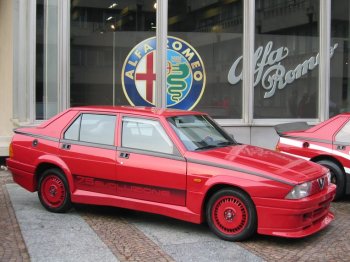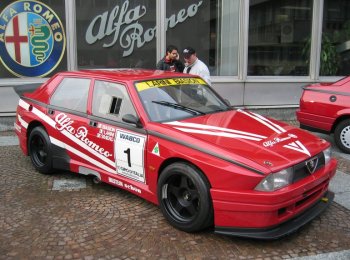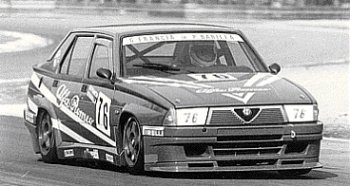|
The exciting new Alfa 159 has
been grabbing the headlines all year, but 2005 also marks
the 20th anniversary of the arrival on the market of the Alfa 75, regarded
by many as the last true Alfa Romeo sedan, and one which -
in engineering terms at least - marked the end of a fabulous era in the
Milanese marque's long history.
Earlier this month a 20th anniversary celebration was held
at the Arese facility in Milan, where a large gathering of Alfa 75s
rubbed shoulders with the many famous historic Alfa Romeos
that are housed in the official Museo (not to forget the Museo's
own Alfa 75 representation which includes the fearsome Alfa 75 IMSA
race car) and present day cars such as the new Alfa 159
itself and the
simply gorgeous 8C Competizione concept sportscar.
Introduced in May 1985, the Alfa 75 (or 'Milano' as is was
known in the USA),
named to celebrate 75 years of Alfa Romeo's existence, was developed as
the successor to the Giulietta and Alfetta models, and in
fact the entire
mechanical basis was taken from these cars. A mid size
saloon the Alfa 75 continued the unusual Alfa Romeo design
of having the engine situated at the front and the gearbox
at the rear to provide for an excellent distribution of the weight. Only ever
produced in one bodystyle, a four door saloon (with a drag
coefficient 0.34), the Alfa 75 was the last car to use the Alfetta mechanicals.
At its launch,
the engines were as follows: 1600 (1570cc, 110bhp), 1800
(1779cc, 120bhp) and 2000 (1962cc, 128bhp) all four cylinder
units with carburettors, a 2500 fuel injection V6 in the
Green Cloverleaf version (2492cc, 156bhp), and a 2.0 turbo
diesel (1995cc, 95bhp). During the following year, 1986, the
Alfa 75 turbo was introduced. This saw the 1779cc twin cam
engine fitted with a Garrett T3
turbocharger, fuel injection, intercooler and oil-cooler,
all adding up to produce 155bhp.
|


 |
|
Earlier this month a
event was held at Arese in Milan to celebrate the 20th
anniversary of the introduction of the Alfa Romeo 75
sedan, it was attended by many present owners of a
model that is now firmly a part of the
marque's history |
|

 |
|
The Alfa 75 Turbo
Evoluzione and the racing version appeared during
the Alfa 75's 20th anniversary
celebrations |
|
|
 |
|
Introduced in May 1985, the Alfa 75 sedan, named to celebrate 75 years of Alfa Romeo's
existence, was developed as the successor to the Giulietta
and Alfetta |
|
 |
|
Alfa Corse - the
factory's in house competitions' arm - raced the
Alfa Romeo 75 Turbo in top-flight touring car
racing, its array of drivers including then rising
Italian single-seater stars Nicola Larini and
Gabriele Tarquini, former F1 pilots Sandro Nannini
and Jacques Laffite, as well as the Indycar legend
and former FIA F1 World Champion,
Mario Andretti |
|
|
This engine was also
developed for motorsport and it gained some successes in a very short lived
career (including a third place overall in the 1987 Tourist Trophy,
held at
Silverstone). The competition cars were heavily developed
and included such changes as coilover front suspension
(replacing the torsion bars), outboard rear brakes and
adjustable de Dion rear suspension. Aimed at both cashing in
on the competition success of the Alfa 75 turbo, and for its
FIA homologation, was the 'Evoluzione', which was fitted with extra
bodywork and a luxurious interior, but only sold in small numbers.
In 1987
the venerable twin-cam engine was redesigned to incorporate two
spark plugs per cylinder (as Alfa had also done in the past
with
various race engines) and so the twin-spark was born. The
Alfa 75 received the 2.0-litre version of this engine, which
pumped out a healthy
148bhp, thanks also to variable valve timing and fuel
injection. At the same time, Alfa released the 3.0i V6
America. Visually recognisable due to the black side stripes
being body coloured, it introduced the 186bhp 3-litre
version of the V6 into the Alfa 75 and was aimed at the US
market, incorporating as it did, new front and rear bumpers
which were designed to
meet that country's stringent safety legislation.
In 1988
the Alfa 75's engine line up was again changed, as the carburettor fed 1800
was replaced by the 1.8IE, and a new 2.4-litre turbo diesel
joined the range. The 1.8IE produced the same power as the
earlier version, but the Bosch Motronic fuel injection and
variable valve timing enabled a better torque curve to
be produced. The 2.4 TD unit, a VM engine, came complete
with a KKK turbocharger and intercooler. Aesthetically only
very minor changes were made to these models, and various
parts, such as the 'herringbone' pattern seats, were adopted from the Twin Spark
model.
Late 1989 saw a 1.6IE joining the range (the carburettor
1.6 soldiered on for a while longer too) with 105bhp, whilst
catalysed versions of 2.0 Twin Spark and 3.0 V6 also
emerged, both suffering minor decreases in overall power output.
Slightly later, in 1990, the 1.8 Turbo America was relaunched
as the 1.8 Turbo Quadrifoglio, gaining 10bhp (now up to 165bhp).
The 3.0i V6 also gained 12bhp (up from a catalysed 180bhp to
192bhp) thanks to a new injection system, new camshafts and
a new exhaust system. Both cars received revised suspension
settings to handle the extra power.
The Alfa
75 became well known for its quirky looks from the
outside, and some unusual design features inside, such as
the U-shaped handbrake lever, and the electric window switches,
which were mounted in the
roof lining.
Alfa Romeo
never actually built a coupe version of the Alfa 75, but the SZ/RZ
line - closely based on its chassis, engine and drivetrain
and nicknamed 'Il Monstro' -
can comfortably laid claim to that brief. Meanwhile an
interesting Alfa 75 based concept appeared in 1986 when
Rayton Fissore showed their interpretation of a Alfa 75
estate, called the 'Turbowagon' (being based on the 1.8
turbo car), a pretty design, which unfortunately though never made
it to actual production.
The Alfa 75 heralded the end of an era of evolutionary
'pure' rear wheel drive, rear mounted gearbox and
differential, Alfa Romeo 'family' sedans. It's rakish looks
gave it a distinct, individual appearance which gained it a
strong, dedicated following. The flagship model of the range
- the Alfa 75 3.0 V6 - was a particularly powerful,
able-handling 'sports' saloon that embodied the values that
Alfa Romeo hold so dear.
It was eventually replaced
in 1992 by the all-new, front-wheel-drive Alfa 155, which
was based on the Fiat Tipo's floorpan. The Alfa 155
was in turn followed by the highly regarded Alfa 156, which this autumn has
now given way to the new Alfa 159.
|
|
|
|
![]()
![]()